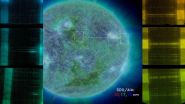Making robots more human
2015-04-29
(Press-News.org) Most people are naturally adept at reading facial expressions -- from smiling and frowning to brow-furrowing and eye-rolling -- to tell what others are feeling. Now scientists have developed ultra-sensitive, wearable sensors that can do the same thing. Their technology, reported in the journal ACS Nano, could help robot developers make their machines more human.
Nae-Eung Lee and colleagues note that one way to make interactions between people and robots more intuitive would be to endow machines with the ability to read their users' emotions and respond with a computer version of empathy. Most current efforts toward this goal analyze a person's feelings using visual sensors that can tell a smile from a frown, for example. But these systems are expensive, highly complex and don't pick up on subtle eye movements, which are important in human expression. Lee's team wanted to make simple, low-cost sensors to detect facial movements, including slight changes in gaze.
The researchers created a stretchable and transparent sensor by layering a carbon nanotube film on two different kinds of electrically conductive elastomers. They found it could tell whether subjects were laughing or crying and where they were looking. In addition to applications in robotics, the sensors could be used to monitor heartbeats, breathing, dysphagia (difficulty swallowing) and other health-related cues.
INFORMATION:
The authors acknowledge funding from the National Research Foundation of Korea.
The American Chemical Society is a nonprofit organization chartered by the U.S. Congress. With more than 158,000 members, ACS is the world's largest scientific society and a global leader in providing access to chemistry-related research through its multiple databases, peer-reviewed journals and scientific conferences. Its main offices are in Washington, D.C., and Columbus, Ohio.
To automatically receive news releases from the American Chemical Society, contact newsroom@acs.org.
Follow us:
Twitter
Facebook
ELSE PRESS RELEASES FROM THIS DATE:
2015-04-29
Today the national science academies of the G7 countries handed three statements to their respective heads of government for discussion during the G7 summit at Schloss Elmau in early June 2015. The papers on antibiotic resistance, neglected and poverty-related diseases, and the future of the ocean were drawn up by the seven national academies under the aegis of the German National Academy of Sciences Leopoldina.
The G7 academies call for a comprehensive strategy to tackle health threats from infectious diseases; progress toward preventing, controlling and eliminating ...
2015-04-29
Computer science researchers have turned to unlikely sources - including Enron - for assembling huge collections of spreadsheets that can be used to study how people use this software. The goal is for the data to facilitate research to make spreadsheets more useful.
"We study spreadsheets because spreadsheet software is used to track everything from corporate earnings to employee benefits, and even simple errors can cost organizations millions of dollars," says Emerson Murphy-Hill, an assistant professor of computer science at NC State and co-author of two new papers ...
2015-04-29
NEW YORK (April 29, 2015) - A new study found one in five nursing home residents with advanced dementia harbor strains of drug-resistant bacteria and more than 10 percent of the drug-resistant bacteria are resistant to four or more antibiotic classes. The research was published online today in Infection Control & Hospital Epidemiology, the journal of the Society for Healthcare Epidemiology of America.
"Nursing home residents with advanced dementia usually have an increased need for healthcare worker assistance, as well as frequent exposure to antibiotics. This combination ...
2015-04-29
An update search enlarged the pool of study data, but did not change the content of the conclusion of the benefit assessment of stem cell transplantation (SCT) for multiple myeloma conducted in 2012. Overall, the evidence base remained insufficient: Until now, data on quality of life have not been recorded in any study at all. And three large studies, some of which were under German management, have not been completely published even more than 10 years after their completion. This is the conclusion of a rapid report published by the Institute for Quality and Efficiency ...
2015-04-29
When consumer budgets grow or shrink, how do spending habits change? A common view is that people with a budget will spend their money on the same number of products, even when their previous budget was lower or higher. But in order to keep their favorite items, consumers whose budgets have shrunk to a particular amount will opt for less variety than someone whose budget has increased to that same amount, according to a new study in the Journal of Marketing Research. Investors beware!
"We call this the budget contraction effect," write authors Kurt A. Carlson (Georgetown ...
2015-04-29
(NEWARK, NJ) - April 29, 2014 - A woman is brutally assaulted, but rather than receiving the sympathy she deserves, she is blamed. If she had dressed differently or acted differently, or made wiser choices, others say, she would have been spared her ordeal. For victims, this "victim blaming" is profoundly hurtful, and can lead to secondary victimization.
Psychologists have long realized that blaming victims is a defense mechanism that helps blamers feel better about the world, and see it as fair and just. But ways to prevent victim blaming have been elusive -- until ...
2015-04-29
The sun's surface is blisteringly hot at 10,340 degrees Fahrenheit -- but its atmosphere is another 300 times hotter. This has led to an enduring mystery for those who study the sun: What heats the atmosphere to such extreme temperatures? Normally when you move away from a hot source the environment gets cooler, but some mechanism is clearly at work in the solar atmosphere, the corona, to bring the temperatures up so high.
Clear evidence now suggests that the heating mechanism depends on regular, but intermittent explosive bursts of heat, rather than on continuous gradual ...
2015-04-29
MISSOULA - Improved drilling technologies and energy demand have resulted in the large-scale expansion of oil and gas development, with 50,000 new wells drilled per year recently in central North America. Locations such as the Bakken, Eagle Ford and the Marcellus Shale are now commonplace, and drilling activity frequently makes news.
But what are the ecological consequences of this accelerated drilling activity? Researchers at the University of Montana have conducted the first-ever broad-scale scientific assessment of how oil and gas development transforms landscapes ...
2015-04-29
Casting a large interdisciplinary research net has helped Simon Fraser University archaeologist Dana Lepofsky and 10 collaborators dig deeper into their findings about ancient clam gardens in the Pacific Northwest to formulate new perspectives.
Lepofsky's research team has discovered that Northwest Coast Indigenous people didn't make their living just by gathering the natural ocean's bounty. Rather, from Alaska to Washington, they were farmers who cultivated productive clam gardens to ensure abundant and sustainable clam harvests.
In its new paper published by American ...
2015-04-29
Being bigger and bolder holds various benefits for male soldier beetles. They enjoy higher rates of successful courtship and more often land a larger, more fertile mate. These are some of the findings of a study led by Denson McLain of the Georgia Southern University in the US, published in Springer's journal Behavioral Ecology and Sociobiology.
The goldenrod soldier beetle or Pennsylvanian leatherwing (Chauliognathus pennsylvanicus) is native to Northern America. During its peak reproductive season, between September to early October, it only mates once a day. This normally ...
LAST 30 PRESS RELEASES:
[Press-News.org] Making robots more human

